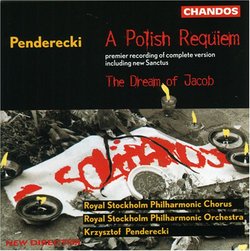| All Artists: Krzysztof Penderecki, Jadwiga Rappe, Royal Stockholm Philharmonic Orchestra, Jadwiga Gadulanka, Zachos Terzakis Title: Penderecki: A Polish Requiem; The Dream of Jacob Members Wishing: 0 Total Copies: 0 Label: Chandos Release Date: 6/18/1996 Genre: Classical Styles: Opera & Classical Vocal, Chamber Music, Historical Periods, Classical (c.1770-1830), Early Music, Modern, 20th, & 21st Century Number of Discs: 2 SwapaCD Credits: 2 UPC: 095115945926 |
Search - Krzysztof Penderecki, Jadwiga Rappe, Royal Stockholm Philharmonic Orchestra :: Penderecki: A Polish Requiem; The Dream of Jacob
 | Krzysztof Penderecki, Jadwiga Rappe, Royal Stockholm Philharmonic Orchestra Penderecki: A Polish Requiem; The Dream of Jacob Genre: Classical
No Description Available. Genre: Classical Music Media Format: Compact Disk Rating: Release Date: 18-JUN-1996 |
Larger Image |
CD DetailsSynopsis
Product Description No Description Available. Genre: Classical Music Media Format: Compact Disk Rating: Release Date: 18-JUN-1996 Similar CDs
|
CD ReviewsSome fascinating moments but nothing seriously cumulative 04/06/1999 (4 out of 5 stars) "Penderecki joined the post-war generation of composers late. But that simply was not a deterrent for his unique contributions. His music developed out of his affinities for a programmatic agenda. An early friendship with the only Marxist of this serial post-Webern generation Luigi Nono helped to set his path in Europe only within the imagery of Catholicism. As time wore on, he as many in the Seventies became bitten by the accessibility bug and turned toward more facile,but not necessarily simple-minded kind of music styles. He found a voice in Neo-Romanticism. This Requiem is cut from that cloth. Largely instigated while the workers seized the Lenin Shipyard in Gdansk in 1980, the budding movement known as Solidarity asked Penderecki to write something for them . "Lacrimosa" was composed in 1980 for the unveiling of a monument at Gdansk. Soon another movement emerged and then a completed full-scale piece was completed in 1984. What is at work here in terms of musical language is a meeting of both the modern world (Penderecki's early avant-garde musical language) and Baroque-like and impassioned Romanticism. Penderecki structually sticks to the traditional Requiem movements Kyrie,Dies Irae, Agnes Dei,Lux Aeterna without much to comment on or reflection with four vocal soloists, soprano,alto(or mezzo-soprano), tenor and bass. What is problematic I fine is the overall emotive weight imposed here on the form. Mostly the music here is magnetized toward the severe, the graphic at times in obvious dark colours of tympani drum and wailing voices. You might say "this is Requiem, what do you expect", well yes, but as we learn from Mozart there are gradations and refined manipulations of voices and gesture which should help the musical discourse. Here the severity doesn't break until some 15 minutes into the work, the first modern use of fascinating cluster chords punctuating the voices.. There are fast running like movements that help break the this severity, but you feel Penderecki is imposing this artificially, you never sense the movements are placed together for an expressive or conceptual reason. We simply follow without question. Although works like this are a rarity within today's concert venues still the work is only convincing in moments. It's overall emotive weight seems never to add to a content in an incremental way, that structures our thinking. Nor has Penderecki imposed any new content from his experiences writing and dealing with programmatic subject matter,"
|

 Track Listings (10) - Disc #1
Track Listings (10) - Disc #1


